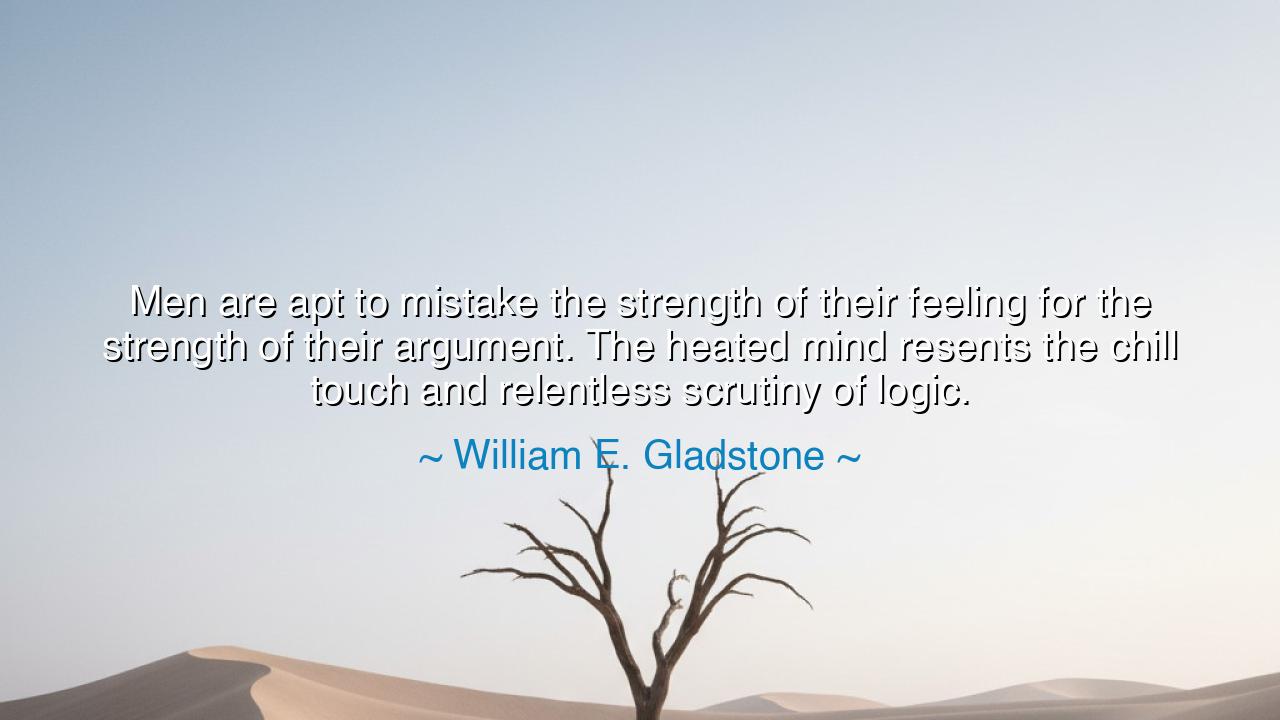
Men are apt to mistake the strength of their feeling for the
Men are apt to mistake the strength of their feeling for the strength of their argument. The heated mind resents the chill touch and relentless scrutiny of logic.






Listen, O children of wisdom, to the words of William E. Gladstone, a man whose intellect and insight into human nature have echoed across the ages. He said, "Men are apt to mistake the strength of their feeling for the strength of their argument. The heated mind resents the chill touch and relentless scrutiny of logic." In these words lies a profound lesson about the nature of emotion and reason, and the great battle between the two that has shaped the course of history, conflict, and the very soul of humanity. Gladstone calls us to recognize the danger of being swayed by the power of our own emotions, and the necessity of logic to guide us toward true understanding.
Consider, O wise ones, the power of feeling. It is a force as ancient as humanity itself, capable of stirring hearts and shaping destinies. The great warriors, the rulers, and the philosophers of the past all knew that the heart can be a powerful guide, but it is also a dangerous one when unchecked. Passion, whether in love, anger, or ambition, often blinds us to the truth. It can make us believe that our feelings are the measure of all things, that the fire in our hearts is the flame of truth itself. Yet Gladstone warns that feelings are not the same as reason. The mind, when heated by emotion, can distort what we see, and we must be vigilant not to mistake the fury of our hearts for the clarity of our reasoning.
In ancient times, O children, we see this very truth played out on the grand stage of history. Think of Achilles, that great hero of the Iliad, whose wrath led him to make decisions that tore his world apart. His passion for revenge, for honor, consumed him, blinding him to the consequences of his actions. In his rage, he mistook the power of his feeling for the power of his reason. He did not pause to reflect, to question, to consider the greater good. Instead, his heated mind resented the chill touch of logic, and so he acted in a way that led to unnecessary suffering. The result was not only the loss of his closest friend, Patroclus, but also the unraveling of his own peace of mind. Had he allowed the logic of his situation to guide him, he might have seen the futility of his vengeance and found a more honorable path.
This same pattern can be seen throughout history, in politics, in wars, and in personal conflicts. Leaders, generals, and philosophers have often struggled with the tension between emotion and reason. When the passions of the people are stirred, whether by fear, pride, or hatred, they can easily mistake the strength of their feelings for the strength of their arguments. The crowds, in their anger, can demand action, pushing leaders toward war or drastic decisions that are driven by emotion rather than by reason. Gladstone’s wisdom tells us that such decisions, born of fiery feeling, often lead to tragedy, because they are not grounded in the cool scrutiny of logic.
Take, for example, the tragic tale of King Lear, a figure in Shakespeare's play who, driven by pride and anger, casts out his daughter Cordelia based on his emotional interpretation of her words. His feeling—the wounded pride of an aging king—led him to mistake a lack of flattery for a lack of love, and in doing so, he set into motion a series of events that caused not only his own downfall but the suffering of his kingdom. Had he been guided by logic, had he taken time to reflect rather than rush into emotional decisions, he might have seen the loyalty and love his daughter truly offered him. Lear's tragedy shows us the immense cost of allowing our emotions to cloud our judgment.
And now, O children, let us turn inward. Each of us, in our lives, faces the delicate balance between emotion and reason. How often do we find ourselves caught in the grip of anger, pride, or fear, making decisions based on how we feel in the moment, without pausing to reflect, to step back, and to reason? We may find ourselves saying things in the heat of an argument, acting impulsively, or allowing our pride to dictate our actions—only to regret them later. Gladstone’s words serve as a guide for us to pause, to reflect, and to recognize the strength of reason when emotions threaten to take the lead. In these moments, the chill touch of logic becomes our greatest ally, allowing us to see the world more clearly and to make decisions that are not ruled by passion but by wisdom.
The lesson, O children, is clear: emotions can be a powerful force, but they must not be allowed to govern our decisions. We must seek balance—allowing our reason to guide us when our hearts are full of heat. Logic does not dismiss feeling, but it provides the cool clarity that helps us navigate the world with wisdom. When you find yourself torn between what you feel and what you know to be true, remember Gladstone's wisdom. Take a moment to breathe, to reflect, and to question whether your feelings are clouding your judgment. Seek the clarity that comes with reason, and let it guide you toward decisions that bring peace and understanding, rather than rashness and regret.






AAdministratorAdministrator
Welcome, honored guests. Please leave a comment, we will respond soon